- About Ramapo
- Academics
- Admissions & Aid
- Student Life
- Athletics
- Alumni
- Arts & Community
- Quick Links
- Apply
- Visit
- Give
Civic Learning and Community Service at the Heart of Alternative Break Programming
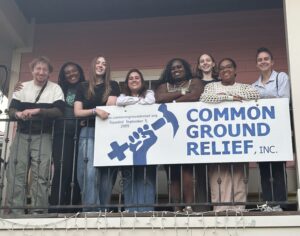
Trips focus on social issues, and this year, students visited New Orleans to help Common Ground Relief
by Liz Mendicino ’26
Eight Ramapo students took the opportunity to engage in service-oriented learning over the course of their spring break, flying down to New Orleans, Louisiana, to help aid in post-hurricane reconstruction. Kayla Brand ‘25, Gillian Forbes ‘26, Jake Hessels ‘26, Tori-Ann Hunt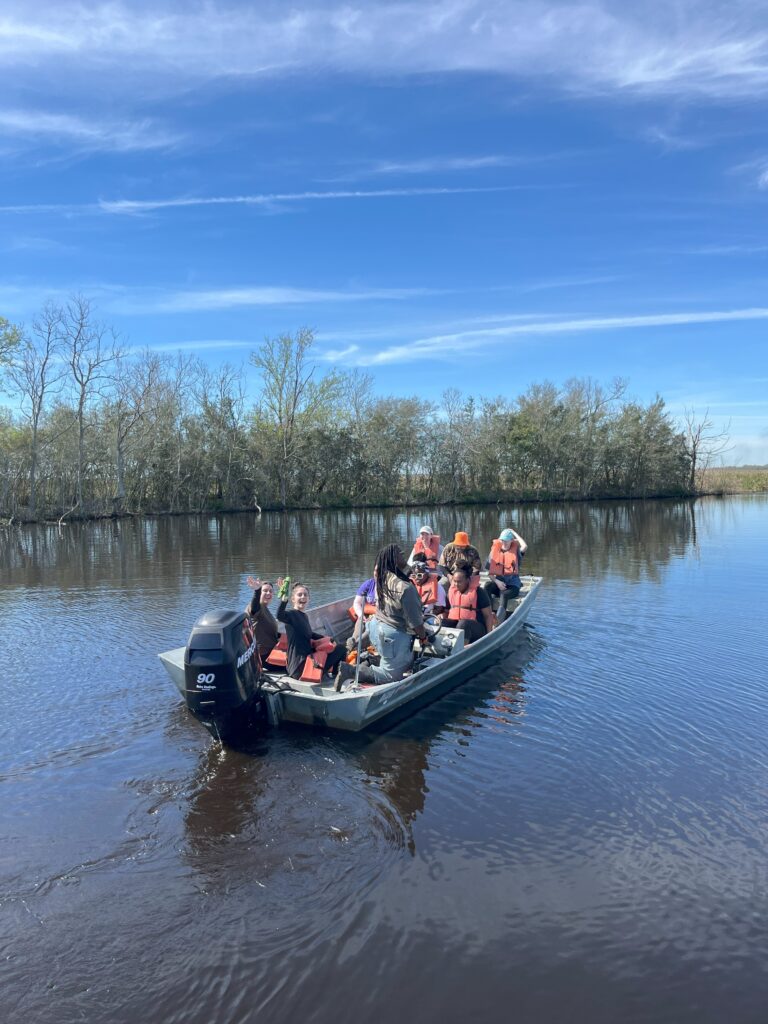 er ‘25, Sarah Luckenbach ‘26, Jackie Reed ‘26, Helen Schlosky ‘25, and Larissa Wade ‘25
er ‘25, Sarah Luckenbach ‘26, Jackie Reed ‘26, Helen Schlosky ‘25, and Larissa Wade ‘25
From March 16 to 22, the group spent their time assisting Common Ground Relief in their mission of restoration of Louisiana’s coastline, planting cypress trees. Hessels and Hunter have both attended alternate break trips in the past. Their majors and campus involvements vary vastly, but they are united in their desire to help others.
“I learned that service isn’t about saving anyone—it’s about showing up, listening, and respecting the history and strength of the communities you walk into,” said Wade. “New Orleans taught me the power of resilience, storytelling, and honoring legacy. It also taught me to appreciate life. I was very stressed before the trip, and it felt like a retreat. I wasn’t on my phone much, I was just enjoying the moments with my friends I already knew before the trip, and my new friends.” Wade chose to attend because she wanted to both participate in learning outside the classroom, and help give back to communities through service.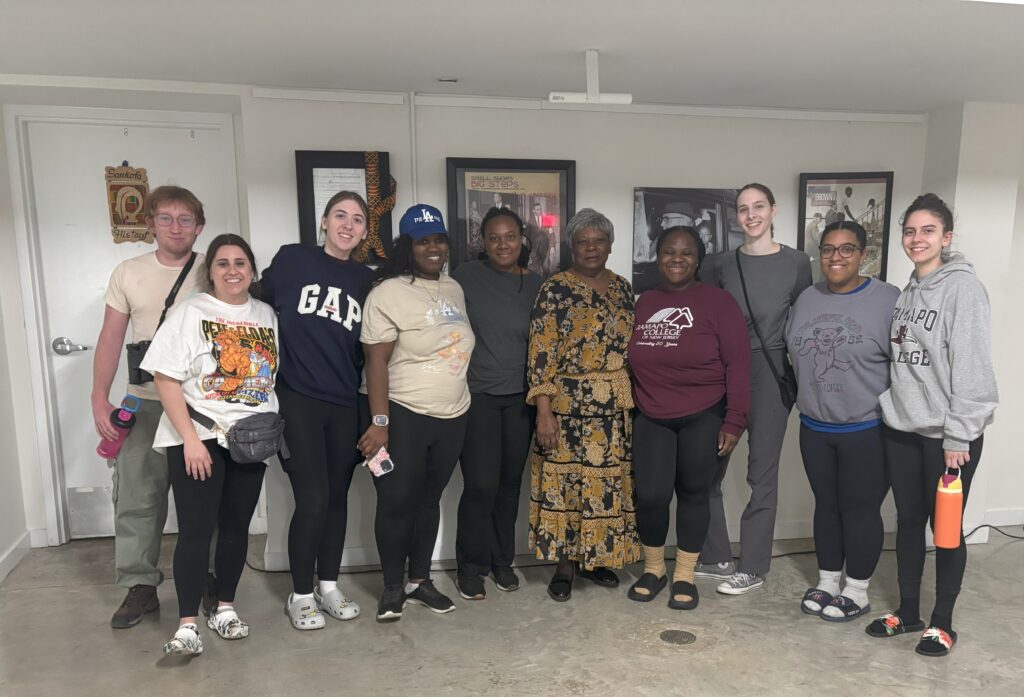 Allie Shapiro, Coordinator for Community Engagement, first reached out to Common Ground Relief during the early summer of 2024. “After looking through programs our office had held in years past, a spring break trip to New Orleans shortly after Hurricane Katrina stuck out to me,” said Shapiro. “Knowing that this year was twenty years since the storm, I felt it was important to revisit this community at this period of its recovery. Much of the work that would have been done ten-fifteen years ago would be mucking and gutting destroyed homes, rebuilding these homes, and connecting community members with vital resources to help mitigate food and housing insecurity that had been amplified by the destruction that Katrina left in its wake.”
Allie Shapiro, Coordinator for Community Engagement, first reached out to Common Ground Relief during the early summer of 2024. “After looking through programs our office had held in years past, a spring break trip to New Orleans shortly after Hurricane Katrina stuck out to me,” said Shapiro. “Knowing that this year was twenty years since the storm, I felt it was important to revisit this community at this period of its recovery. Much of the work that would have been done ten-fifteen years ago would be mucking and gutting destroyed homes, rebuilding these homes, and connecting community members with vital resources to help mitigate food and housing insecurity that had been amplified by the destruction that Katrina left in its wake.”
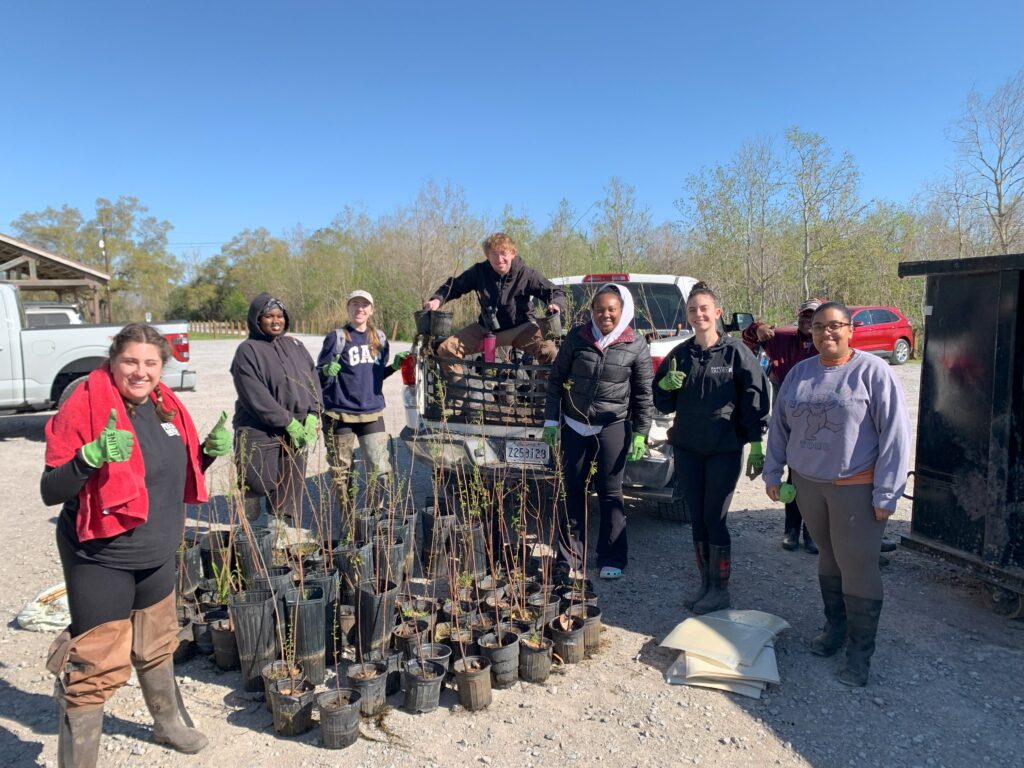 Students learned about the cyclical nature of disaster-prevention and community support, while serving alongside community members in the Lower Ninth Ward alongside another group of college students from Endicott College During their free-time, the group was also able to learn about history and culture in the Lower Ninth Ward and the larger Orleans Parish. This included a visit to the Tate, Ettiene, and Prevost Center to learn about the history of the Civil Rights Movement of the 1950s and ’60s that stemmed from the area; as well as visits to cultural landmarks around the French Quarter such as Cafe du Monde to enjoy beignets, and the New Orleans Jazz Museum to hear live performances and understand how the genre’s history is intertwined with the cities.
Students learned about the cyclical nature of disaster-prevention and community support, while serving alongside community members in the Lower Ninth Ward alongside another group of college students from Endicott College During their free-time, the group was also able to learn about history and culture in the Lower Ninth Ward and the larger Orleans Parish. This included a visit to the Tate, Ettiene, and Prevost Center to learn about the history of the Civil Rights Movement of the 1950s and ’60s that stemmed from the area; as well as visits to cultural landmarks around the French Quarter such as Cafe du Monde to enjoy beignets, and the New Orleans Jazz Museum to hear live performances and understand how the genre’s history is intertwined with the cities.
“My goal with facilitating this opportunity was to have the group draw parallels between the coastlines of Louisiana and New Jersey; specifically comparing some of what they learned about Hurricane Katrina to how Hurricane Sandy impacted the state [of New Jersey] 13 years ago. Importantly, the group was able to bring back ideas and a hunger for environmental stewardship and other forms of community-based support with them. Whether it be facilitating community-focused activities in New Orleans or in their home communities, these students have added this experience to their toolbelt and can pull from it in their future endeavors,” Shapiro continued.
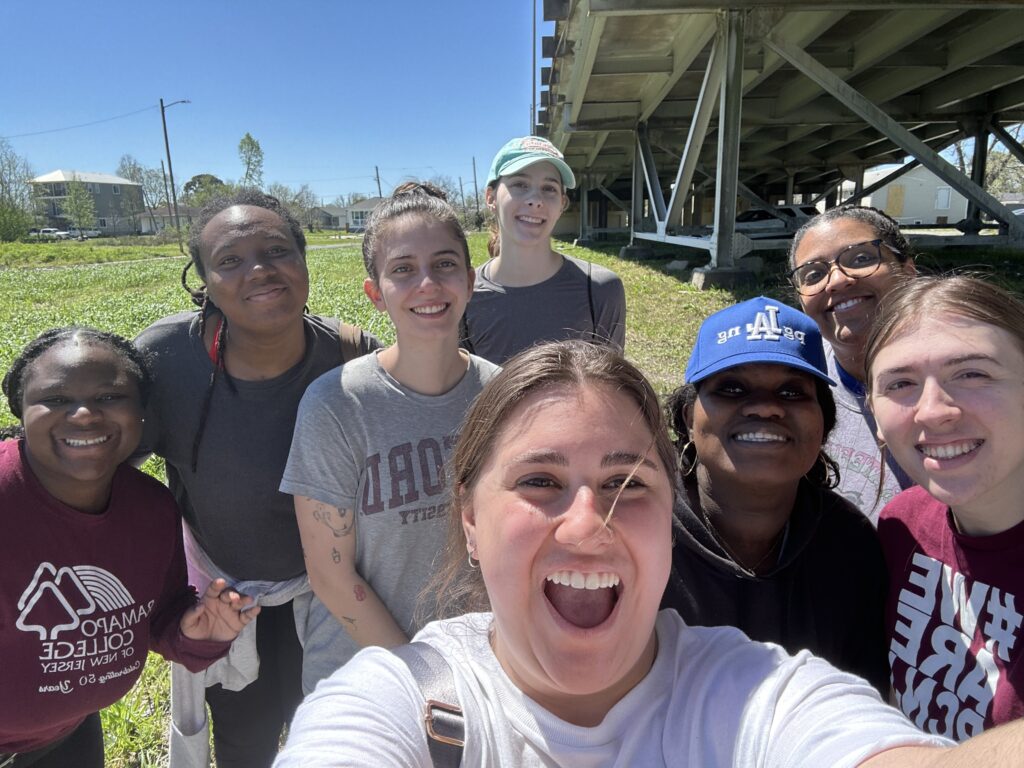 Alternative break trips offer the chance for groups of college students to engage in civic learning and community service, predominantly focused on a particular social issue. Experiences such as these get students to think critically about how they can utilize what they have learned to help others, and take away unique experiences that will help them be ethical change agents in their everyday lives. “I learned a lot about the importance of community and how people view and value you when individuals who live in a community support their community,” said Hessels. “All the staff at Common Ground, while not all from New Orleans, support their community while living in it and it’s very important to highlight that.”
Alternative break trips offer the chance for groups of college students to engage in civic learning and community service, predominantly focused on a particular social issue. Experiences such as these get students to think critically about how they can utilize what they have learned to help others, and take away unique experiences that will help them be ethical change agents in their everyday lives. “I learned a lot about the importance of community and how people view and value you when individuals who live in a community support their community,” said Hessels. “All the staff at Common Ground, while not all from New Orleans, support their community while living in it and it’s very important to highlight that.”
“I learned that New Orleans is still recovering from the 2005 Hurricane Katrina, especially the Lower 9th Ward, where my group lived and worked,” said Lukenbach, on what she learned during the trip. “It’s been 20 years, and the community is still living with the hurricanes’ devastating effects. That’s why restoration work, such as planting native Bald cypress trees, is so important for this area, because doing so will help mitigate the impacts future natural disasters may have on New Orleans and its residents.”
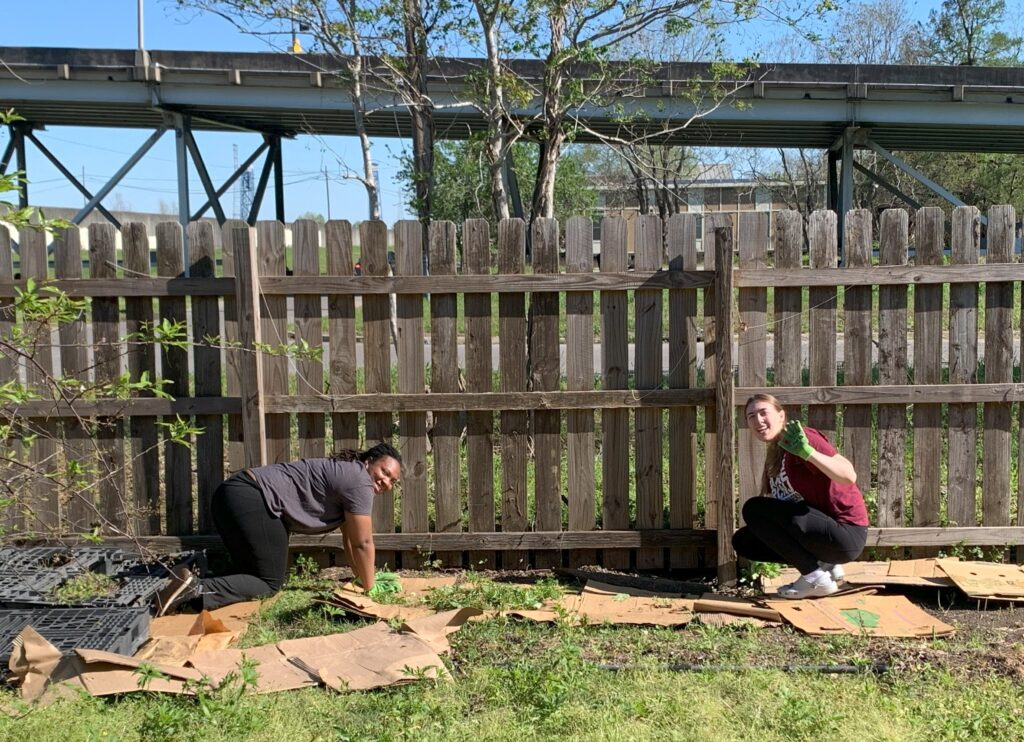 Common Ground Relief was originally started in 2005 with a focus on providing disaster relief after Hurricane Katrina. Headquartered in the Lower Ninth Ward of New Orleans, the community members that made up this grassroots group saw the impacts that the hurricane had on the community in so many aspects; including environmentally. Twenty years after the storm, students worked alongside community members to help continue to restore Louisiana’s coastline, while learning about Katrina’s impact. The group also spent a day in the French Quarter. “If one of the alternative break trips sounds interesting to you, just go for it! I understand you may feel hesitant to go out of your comfort zone and visit a place you’ve never been before with people you may not know, but I guarantee you that you will derive satisfaction from the volunteer work you will do and the new friendships and life-long memories you will make,” said Lukenbach.
Common Ground Relief was originally started in 2005 with a focus on providing disaster relief after Hurricane Katrina. Headquartered in the Lower Ninth Ward of New Orleans, the community members that made up this grassroots group saw the impacts that the hurricane had on the community in so many aspects; including environmentally. Twenty years after the storm, students worked alongside community members to help continue to restore Louisiana’s coastline, while learning about Katrina’s impact. The group also spent a day in the French Quarter. “If one of the alternative break trips sounds interesting to you, just go for it! I understand you may feel hesitant to go out of your comfort zone and visit a place you’ve never been before with people you may not know, but I guarantee you that you will derive satisfaction from the volunteer work you will do and the new friendships and life-long memories you will make,” said Lukenbach.
Trips range from 2 – 10 days in duration. Through these trips, students become immersed in the political, social, and cultural dynamics of the communities where they are volunteering. During these trips, students often stay in non-traditional or communal housing with their group and their group leader. Participation in alternative breaks allows for connection with their peers, along with larger communities across the country and the world.
Learn more by visiting the Alternative Break Program website or contact Allie Shapiro.
Copyright ©2025 Ramapo College Of New Jersey. Statements And Policies. Contact Webmaster.

Follow Ramapo